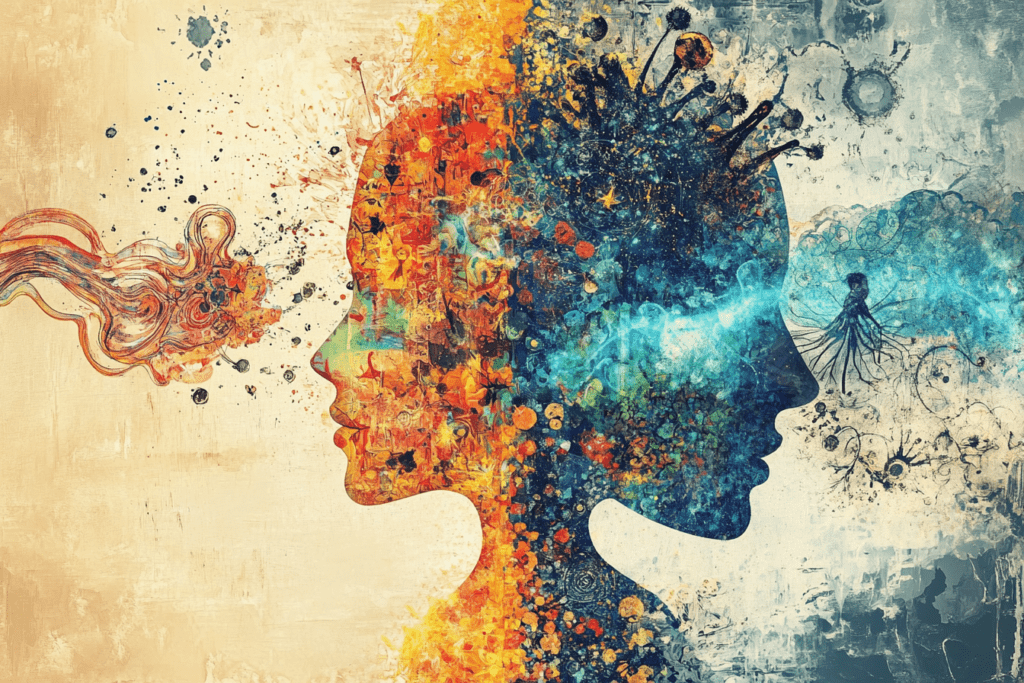
Introduction to Body-mind connection
Alright, folks, let’s get real about the Body-mind connection. Life can be an absolute circus, can’t it? We’re constantly juggling a dozen things at once, from family commitments to work stress, and often it feels like we’re one step away from the whole tent collapsing on us. So, here’s a crazy idea: what if you could improve your life by getting your body and mind to finally shake hands and work together?
I’ve been around the block enough times to know that when you’re out of sync—when your mind’s racing a million miles an hour and your body’s running on fumes—it’s a fast track to burnout. But here’s the kicker: our mental and physical health are connected, deeply so. Think of them as two best mates who are sometimes too stubborn to admit they need each other. Embracing the body-mind connection is not only possible but crucial for a better life.
In this article, we’re not just diving into fluffy wellness tips. We’re talking about grounded, practical ways to bring some balance into your life—stuff like mindfulness, a bit of energy healing with Reiki (no crystals or chanting required promise), and a realistic approach to nutrition. Let’s get into it.
The Science Behind the Body-Mind Connection
Let’s start with a bit of brainy talk, shall we? There’s actual science behind the body-mind connection, and it’s more than just mumbo-jumbo. Research shows that stress, negative thoughts, and emotional baggage can all impact your physical health—everything from your immune system to your heart health can take a hit when you’re carrying around mental clutter. And the other way around? Physical symptoms like fatigue or chronic pain can be massive red flags from your body, screaming at you to take care of your mental health.
At the core of all this is energy. Nope, not in some magical sense—I’m talking about the physical and emotional energy you put into everything you do. When it gets blocked or burned out, that’s when the wheels start coming off. Enter Reiki: an ancient practice that’s all about moving that energy around, releasing those blocks, and bringing balance. But we’ll get into that later. For now, just remember: mind and body need to work together like a decent tag team.
Mindfulness and Meditation: Finding Some (Realistic) Peace

I get it. Most people think mindfulness is about sitting cross-legged on a mat, staring at a candle, and trying to “find your centre.” But I promise you, it’s a lot more practical than that. Mindfulness is just about tuning in to what’s happening here and now. When you’re mindful, you notice your thoughts without letting them boss you around, and you’re more aware of what’s happening in your body—like noticing the tension creeping up when you’re stressed.
Start small. Five minutes in the morning or while you’re having a cup of tea, just focus on your breathing and pay attention to any thoughts that pop up. It won’t be perfect, but it will help you handle stress before it builds up. Studies show that mindfulness can reduce cortisol (that pesky stress hormone) and improve focus and emotional stability. It’s like giving your brain a regular tune-up. Trust me, it works.
Reiki: No Chanting, Just Realigning
Reiki might sound a bit mystical, but stay with me here. It’s an energy healing technique that focuses on unblocking the places where stress and negative energy get stuck. Think of it as hitting the “reset” button on your body’s energy flow. Reiki doesn’t require you to do anything bizarre or uncomfortable—you just need to be open to it. A good practitioner can help you clear that energy, making you feel lighter, less stressed, and maybe even a bit more at peace.
I used to be sceptical about Reiki myself. But after a session or two, it was like some of the noise in my head got turned down, and I felt this sense of calm that was real. So, if you’re on the fence, give it a go. Worst-case scenario, you get a chance to relax. Best case? You walk out feeling better than you have in ages.
Food for the Soul: Integrative Nutrition
Look, I love a good takeaway as much as the next person, but there’s something to be said about feeding your body right if you want it to serve you well. When I say integrative nutrition, I’m talking about thinking beyond just “eating healthy.” It’s about choosing foods that support your mental as well as physical health.
For example, omega-3 fatty acids found in fish and nuts have been shown to improve brain function and reduce anxiety. Leafy greens packed with magnesium help your body handle stress better. And don’t get me started on water—staying hydrated alone can boost your mood and energy. Integrative nutrition doesn’t mean giving up every indulgence; it’s about balance and adding in things that fuel both your body and mind.
Getting Started with Nutrition: Practical Steps
- Add Omega-3s: Foods like salmon, walnuts, and chia seeds. Good for the brain, good for the body.
- Greens Are Gold: Spinach, kale, and broccoli are not only nutrient-dense but also support stress management.
- Hydrate, Hydrate, Hydrate: Water is your best friend. Start each day with a big glass to kick things off.
Bringing It All Together: Realistic, Daily Practices
Alright, you’re probably thinking, “That all sounds great, but how do I fit this into my life?” You don’t have to overhaul everything at once. Start with one or two things that feel doable and build from there. Here’s a little blueprint to get you started.
- Try a Mindfulness Practice: Just five minutes in the morning or evening can make a difference.
- Book a Reiki Session: Test the waters and see if it resonates with you.
- Incorporate Nutrient-Dense Foods: Add a handful of nuts or a leafy salad to your lunch.
- Move Your Body: Go for a walk or stretch—it’s a great way to let off steam.
- Set Boundaries for Self-Care: Say no to things that drain you, and yes to things that refill your cup.
A Bit of History on Holistic Health
Holistic health practices have been around longer than our modern rush-around-like-headless-chickens lifestyle. Ancient cultures—think Egypt, India, and China—were all about balance. They knew that taking care of the mind and body as one could stave off illness and improve quality of life. Back then, they didn’t have the research we do today, but they understood the value of lifestyle, preventative care, and emotional balance. It’s only in recent years, as chronic stress and lifestyle diseases have skyrocketed, that people are realizing these ancient practices were onto something.
Today, people are coming back to holistic health, not as a trend but as a necessity. We’re starting to see the value of things like mindfulness, meditation, and integrative nutrition—and practices like Reiki are being embraced as powerful tools for stress relief and healing. I mean, if it works, why question it?
In Conclusion: The Journey to Balance
Life’s a ride, but you can enjoy it a lot more if you’re not constantly dragging your body behind your overworked mind. The body-mind connection is real, and nurturing it doesn’t have to mean selling your soul to a juice cleanse or joining a yoga retreat. It’s about practical, meaningful steps that make a difference, even if it’s just five minutes of mindfulness or a little more thought about what’s on your plate.
So, start small, listen to your body, and remember: you’re in charge of your well-being. The journey to a balanced, fulfilling life isn’t always easy, but trust me—it’s worth it. Take it from someone who’s been around the block and back again. The road to wellness isn’t always straight, but each step brings you closer to a life that feels just a bit lighter, a bit calmer, and a lot more worthwhile.